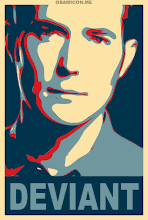Being a Consumer in America
Now that the Deviants are relocated to suburbia, I have taken notice of the surroundings. More to the point, I notice what people drive and the things they have. Those who drive Cadillac Escalades and similarly souped up SUVs have always confused me. They have, from their start, seemed decadent and unnecessary.
Today I saw this quote and it really grabbed me. Hence, I will be grabbing the book, soon.
-Juliet B. Schor, The Overspent American: Why We Want What We Don't Need (1999, Harper Paperbacks)
Courtesy of Treehugger.
Today I saw this quote and it really grabbed me. Hence, I will be grabbing the book, soon.
American consumers are often not conscious of being motivated by social status and are far more likely to attribute such motives to others than to themselves. We live with high levels of psychological denial about the connection between our buying habits and the social statements they make.
Most Americans would deny that, by their spending, they are seeking status, in the usual meaning of the word—looking to position themselves in a higher economic stratum. They might point out that they don't want everything in sight, that purchases are often highly selective. Indeed, what stands out most about much of the recent spate of spending is its defensive character. Parents worry that their children need computers and degrees from good colleges to avoid being left behind in the global economy. Children, concerned about being left out in the here and now, demand shoes, clothes, and video games. ... Increasingly overworked, adults need stress-busting weekends, microwaves, restaurants meals, and takeout to keep up with their daily lives. But the cost of each of these conveniences add up.
-Juliet B. Schor, The Overspent American: Why We Want What We Don't Need (1999, Harper Paperbacks)
Courtesy of Treehugger.
Labels: American Consumers, Cost of Convenience, Economics, parenthood, Social Status, SUVs, Treehugger


0 Comments:
Post a Comment
<< Home